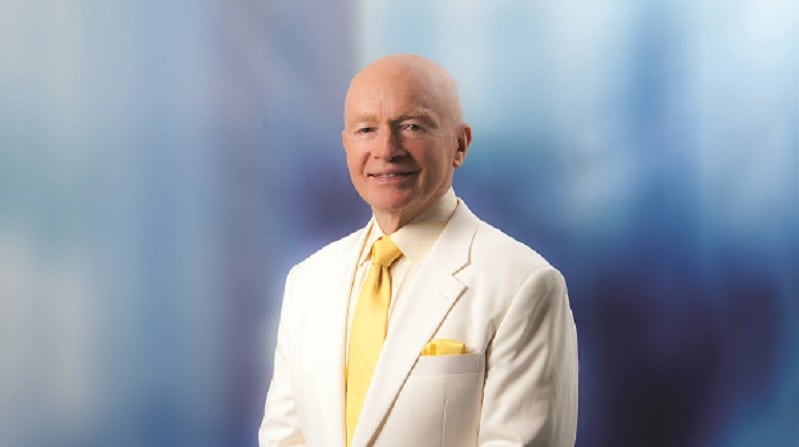Chetan Sehgal was thrust into the role of lead manager on the £2.2bn investment trust in February, when Carlos Hardenberg, who took over from Mobius in October 2015, announced he was exiting the firm. His departure came as a shock given Mobius had only just retired having overseen a carefully prepared succession plan for the fund.
Hardenberg finishes at Franklin Templeton’s London office at the end of March. His next steps have not been confirmed, but in February Mobius confirmed he had applied for fund management licences in London and Luxembourg to launch an emerging and frontier markets fund with an ESG focus.
On Tuesday, Mobius announced on LinkedIn that his eponymous firm was seeking to recruit investment analysts and a sales and marketing manager in its London office. The Mobius Capital Partners LinkedIn page said the firm was “focused exclusively on delivering positive impacts” and will use an ESG approach.
Father figure
Despite the move, Sehgal spoke positively of Mobius earlier this month on his first trip to London since his promotion as lead portfolio manager at the investment trust.
“He’s a guru, he’s a mentor, he’s a father figure. We really wish him well in his new venture. Whatever he does we don’t view him as a competitor; he’s part of the family.”
Sehgal knows Mobius well, having joined Franklin Templeton in 1995 as a senior analyst in the Mumbai office, where he has largely been based for the last two decades, although he also did a stint in Russia.
Last year he moved to Singapore, where he will now be senior managing director and director of portfolio management in the newly restructured emerging markets equity group, which oversees $21bn. He will be responsible for overseeing global emerging markets, small cap and Latin America and Eastern Europe strategies.
Manraj Sekhon was appointed to the newly-created role of CIO of emerging markets equity under the changes, which were announced in January, while Sukumar Rajah takes on responsibilities for Asian emerging market equities and Bassel Khatoun oversees frontier markets and MENA. Tek Khoan Ong remains director of research for the division.
“Over the last 20 years the centre of gravity of emerging markets has shifted far more towards Asia. It’s important to get Asia right,” Sehgal said.
Rajah and Ong are based in Singapore alongside him, while Khatoun is based in Dubai.
London changes
Hardenberg moved from Turkey to London in summer 2016 meaning he could liaise with investors of the London Stock Exchange-listed investment trust.
Sehgal said clients appreciate his job “needs to be done in Singapore”, but Franklin Templeton will likely make a senior hire in London or Europe to liaise with investors in the London Stock Exchange-listed investment trust. “We will ensure the clients of Temit are taken care of,” he said.
A Winterflood Investment Trust analyst note from 13 March said recruitment plans to strengthen the immediate management team were underway. “We expect the London appointee to be someone of sufficient calibre to act as the fund’s face for its largely UK-based investors,” said research analyst Simon Elliott.
Winterflood, which cut Temit from its recommended list following Hardenberg’s departure, said the emerging markets team was particularly well-resourced in India and MENA.
But Sehgal acknowledges he will be in London at least once a quarter for board meetings and to see shareholders.
He added: “It’s important to meet clients and keep up the engagement. We also have a big UK office; it’s not just me alone.”
Departures
As well as Mobius’s retirement and Hardenberg’s sudden exit, Winterflood said up to eight people had left the investment team in the last couple of months.
Sehgal said that number needed to be considered in the scheme of the total emerging markets team, which, excluding private equity, employs more than 70 investment professionals.
He said there are typically two or three people in each office to access local flow of information. The largest teams are in India, Korea and Brazil, but there are also equity professionals in Buenos Aires, Bucharest, Bangkok, South Africa and Istanbul.
“One of the big advantages of Templeton over other players is that we decided it is better to be local everywhere. We are local in most markets. In fact, in India we are a household name.”
Corporate change aside, Sehgal is optimistic on the outlook for the asset class.
“Over a period of time as investor confidence grows in emerging markets we’ll see more structural allocation to emerging markets. People will stop thinking of emerging markets as a cyclical play.”
Temit has returned 13.6% over one year and 38.9% over three years compared to 8.5% and 28.9% respectively in the Global Emerging Markets sector. Over the last three months it has fallen 3.9% and the sector has lost 3.4%; however, the investment trust’s NAV has lost just 0.5% over the period.










